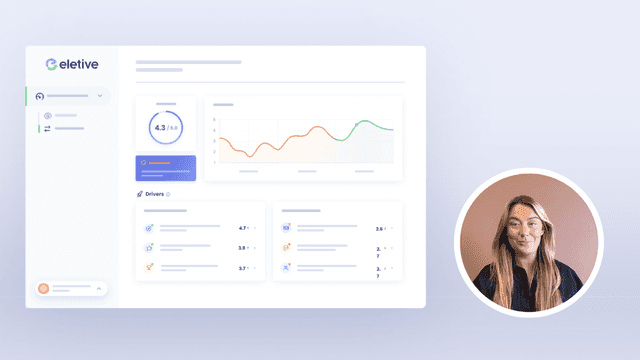High employee turnover in retail is a common and costly problem. Let’s have a look at different ways to decrease retail employee turnover and increase retail staff retention.
High employee attrition is a persistent challenge in the retail industry. According to McKinsey, the yearly employee turnover among frontline retail workers has been over 60 percent for a long period. This problem became even more prominent during the pandemic, and now many retail companies are struggling both to retain retail staff and to attract new employees.
High employee turnover leads to increased costs and a lack of consistency within the workforce. In this article, we will explore several strategies that companies in the retail industry can use to reduce employee turnover and improve employee engagement. By implementing these strategies, companies can create a positive work environment that supports and motivates employees, which can help retain top talent and improve overall performance.
Recommended reading: How to engage blue-collar workers with employee engagement surveys
Employee turnover in the retail industry
The exact rates of employee turnover and employee engagement in the retail industry varies depending on a range of factors, such as the size and location of the company, the type of products or services it offers, and the overall state of the economy. It is important for companies in the retail industry to regularly monitor and assess these metrics in order to identify potential challenges and implement strategies to improve them.
Recommended reading: How employee engagement impacts customer satisfaction
7 steps to decrease employee turnover in the retail industry
There are several steps that companies in the retail industry can take to address high employee turnover rates. These include:
Conducting exit interviews with departing employees to better understand the reasons for their departure and identify any underlying issues that need to be addressed.
Providing clear communication and regular feedback to employees to help them feel valued and engaged in their work.
Offering competitive salaries and benefits to attract and retain top talent.
Investing in training and development programs to help employees build the skills they need to succeed in their roles and advance within the company.
Creating a positive work environment that supports employees and encourages collaboration and teamwork.
Recognising and rewarding employees for their contributions to the company.
Engaging employees in decision-making processes and seeking their input on issues that affect them.
Implementing these strategies can help reduce employee turnover and improve employee engagement in the retail industry.
Recommended reading: Retail case study – from one yearly survey to agile pulse surveys
Employee engagement surveys can help increase employee retention in the retail industry
Employee pulse surveys are a type of survey that are designed to assess employees' attitudes and opinions on a regular basis. They can be useful for measuring employee engagement and identifying potential issues that may impact retention. By conducting regular pulse surveys, companies in the retail industry can gain insight into how employees are feeling and what they need to be more engaged and committed to their work.
There are several ways that regular pulse surveys can help improve employee engagement and retention in the retail industry. First, they can provide a platform for employees to share their thoughts and opinions on a regular basis, which can help management gain a better understanding of the factors that impact employee satisfaction and engagement. This can help managers identify areas for improvement and implement targeted strategies to address them.
Second, pulse surveys can help companies track trends and changes in employee engagement over time. By regularly conducting surveys and comparing the results, companies can identify patterns and trends that may indicate potential issues that need to be addressed. This can help managers stay on top of emerging challenges and take action to prevent them from impacting employee engagement and retention.
Third, pulse surveys can help create a culture of transparency and open communication within the organization. By regularly soliciting employee feedback and actively addressing their concerns, companies can foster a culture of trust and respect, which can help improve employee engagement and retention.
Overall, regular employee pulse surveys can be a valuable tool for companies in the retail industry looking to improve employee engagement and retention. By using these surveys to regularly assess employee attitudes and opinions, companies can gain valuable insights and take action to address potential issues and improve employee engagement.
Recommended reading: How intelligent employee surveys can improve your people strategy

KIOSK codes make employee surveys accessible for all employees
A KIOSK code is a type of code that can be used in employee surveys to allow blue-collar workers, such as retail staff in different locations, to easily access and complete the survey on a kiosk or other self-service device. This can be particularly useful for employees who may not have regular access to a computer or may not be comfortable completing surveys on a traditional computer or mobile device.
To use a KIOSK code for an employee survey, the employee locates the KIOSK or self-service device, which may be located in a break room or other common area within the workplace. They then enter the kiosk code into the device, which allows them to access and complete the survey.
Using a kiosk code for employee surveys helps improve participation rates among retail staff and other blue-collar workers, as it makes it easier and more convenient for them to access and complete the survey. This leads to a more accurate and representative picture of employee attitudes and opinions in the whole organisation, which is valuable for companies looking to improve employee engagement and retention. Additionally, using KIOSK codes can help ensure that all employees, regardless of their job role or technical expertise, have the opportunity to participate in the employee engagement survey and have their voices heard.
Connect insights to actions
With Eletive, you get access to all the tools you need to measure and increase employee engagement: employee engagement surveys, in-app advice and suggested actions, action plans, one-on-one meetings, 360 surveys, and much more. Get in touch with our team of experts to learn how your organisation could benefit from a modern employee engagement tool!

























